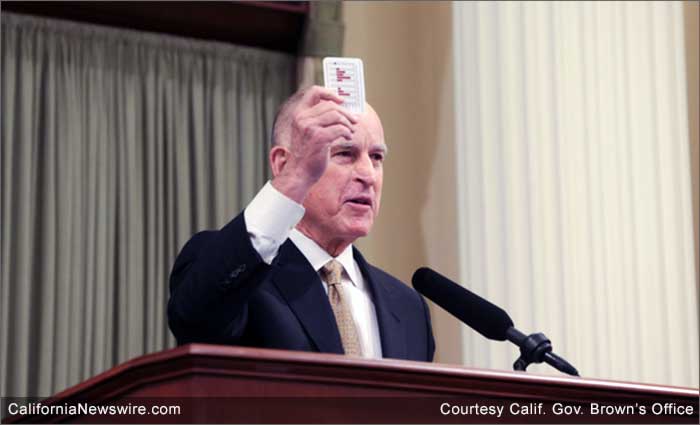LOS ANGELES, Calif. /California Newswire/ — On Monday, Calif. Governor Edmund G. Brown Jr. welcomed the United Nations’ top climate change official, Christiana Figueres, to Los Angeles, where they convened half a dozen leading scientists to discuss climate impacts in the Golden State – and beyond – and the need for swift, decisive action at every possible level.
“As we get ready for the Paris conference on climate change, California is playing a unique role,” said Governor Brown. “While we’re only one percent of the carbon pollution in the world, we’re a significant player, and that’s why California is joining with other provinces and other states and even with countries, such as China and Mexico, to forge the international agreements and initiatives that are absolutely essential if we’re going to avoid the catastrophic changes that are looming in the very near future.”
“We humans are actually on a path to destroy that which has been created over millions of years. That is something that we cannot allow to happen,” said United Nations Framework Convention on Climate Change (UNFCCC) Executive Secretary Christiana Figueres. “Arresting climate change is too complex, too important, too critical, too urgent to rest only on the shoulders of those who are already acting. In that sense, this is a very, very clear call with Governor Brown to encourage other stakeholders to also put their shoulder to the wheel.”
Christiana Figueres has been involved in climate change negotiations for two decades and was appointed Executive Secretary of the UNFCCC by United Nations Secretary-General Ban Ki-moon in 2010 and reappointed for a second three-year term in July 2013.
Today’s meeting comes just six months ahead of the United Nations Climate Change Conference, also known as the 21st session of the Conference of the Parties to the UNFCCC, or COP21, which Governor Brown plans to attend. The aim of the conference is to reach, for the first time, a universal, legally binding agreement that will enable the world to combat climate change effectively and boost the transition towards resilient, low-carbon societies and economies. It is one of the largest climate conferences ever organized and will be held from November 30 to December 11, 2015 in Paris, France.
The meeting between Governor Brown and UNFCCC Executive Secretary Figueres was held at the Natural History Museum of Los Angeles County and included California Air Resources Board Chair Mary Nichols and scientists from some of California’s leading universities and research institutions, including:
– Dr. Tony Barnosky, Professor of Integrative Biology, Curator of Fossil Mammals in the Museum of Paleontology and Research Paleoecologist in the Museum of Vertebrate Zoology, University of California, Berkeley
– Dr. Dan Cayan, Director of the Climate Research Division, Oceanographer and Meteorologist, Scripps Institution of Oceanography, University of California, San Diego
– Dr. William Collins, Senior Scientist and Climate Sciences Department Head, Professor in Residence, Department of Earth and Planetary Science, University of California, Berkeley
– Dr. Liz Hadly, Paul S. and Billie Achilles Professor in Environmental Biology and Senior Fellow at the Woods Institute for the Environment, Stanford University
– Dr. Veerabhadran Ramanathan, Professor, Scripps Institution of Oceanography, University of California, San Diego; United Nations Educational, Scientific and Cultural Organization Professor of Climate and Policy, TERI University, Delhi, India
– Dr. Ben Santer, Research Scientist, Program for Climate Model Diagnosis and Intercomparison, Lawrence Livermore National Laboratory
After the meeting concluded, the participants toured the museum’s Age of Mammals exhibit, which traces mammal evolution – from the extinction of large dinosaurs to the rise of humans – within the context of epochal changes in the Earth’s geology and climate.
As the clock ticks for national governments to reach a deal to reduce harmful emissions ahead of the conference, Governor Brown is focused on building and broadening collaboration amongst states and provinces – at the “subnational” level – to reduce greenhouse gas emissions.
Last month the Governor convened international leaders from 11 other states and provinces, collectively representing more than $4.5 trillion in GDP and 100 million people, to sign a first-of-its-kind agreement to limit the increase in global average temperature to below 2 degrees Celsius – the warming threshold at which scientists say there will likely be catastrophic climate disruptions.
The agreement, called the Under 2 MOU, provides a template for the world’s nations to follow and other states and provinces are expected to become signatories in the weeks and months ahead.
This builds on other international climate change pacts between California and leaders from Mexico,China, North America, Japan, Israel and Peru and the Governor’s efforts to help forge and highlight scientific consensus around climate change.
Earlier this year, Governor Brown issued an executive order to reduce greenhouse gas emissions in California 40 percent below 1990 levels by 2030 – the most ambitious target in North America – and announced in his inaugural address new 15 year targets to: increase from one-third to 50 percent our electricity derived from renewable sources; reduce petroleum use in cars and trucks by up to 50 percent; and double the efficiency savings from existing buildings.
Next month, Governor Brown will join other international leaders, including former U.S. Vice President and Nobel laureate Al Gore and former president of Mexico Felipe Calderón, to deliver keynote remarks at the Climate Summit of the Americas in Toronto, Canada.








